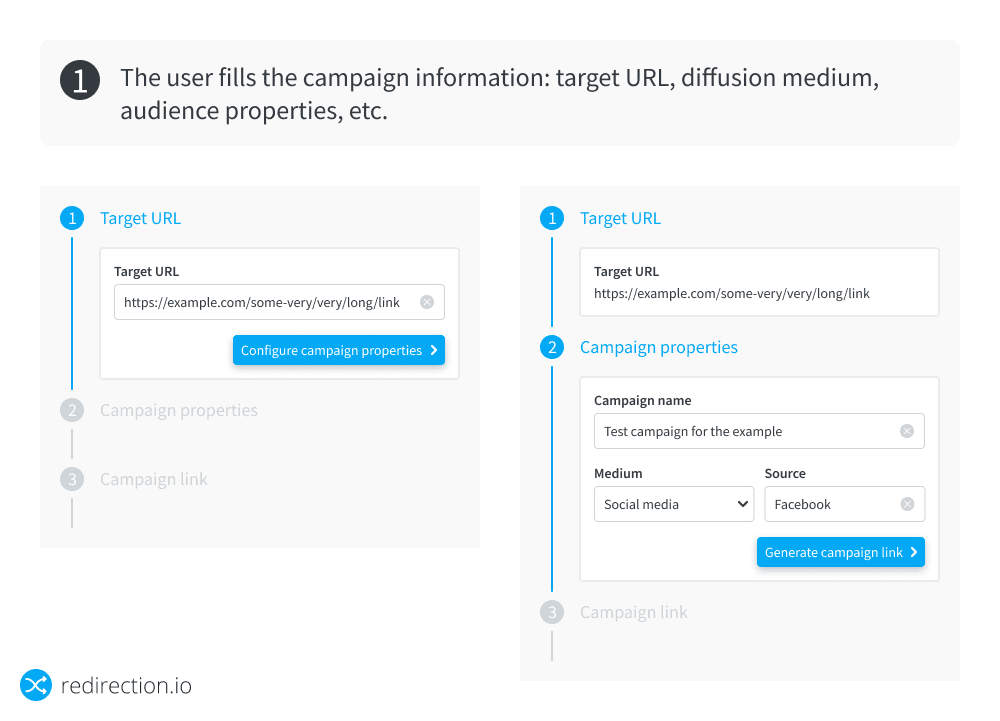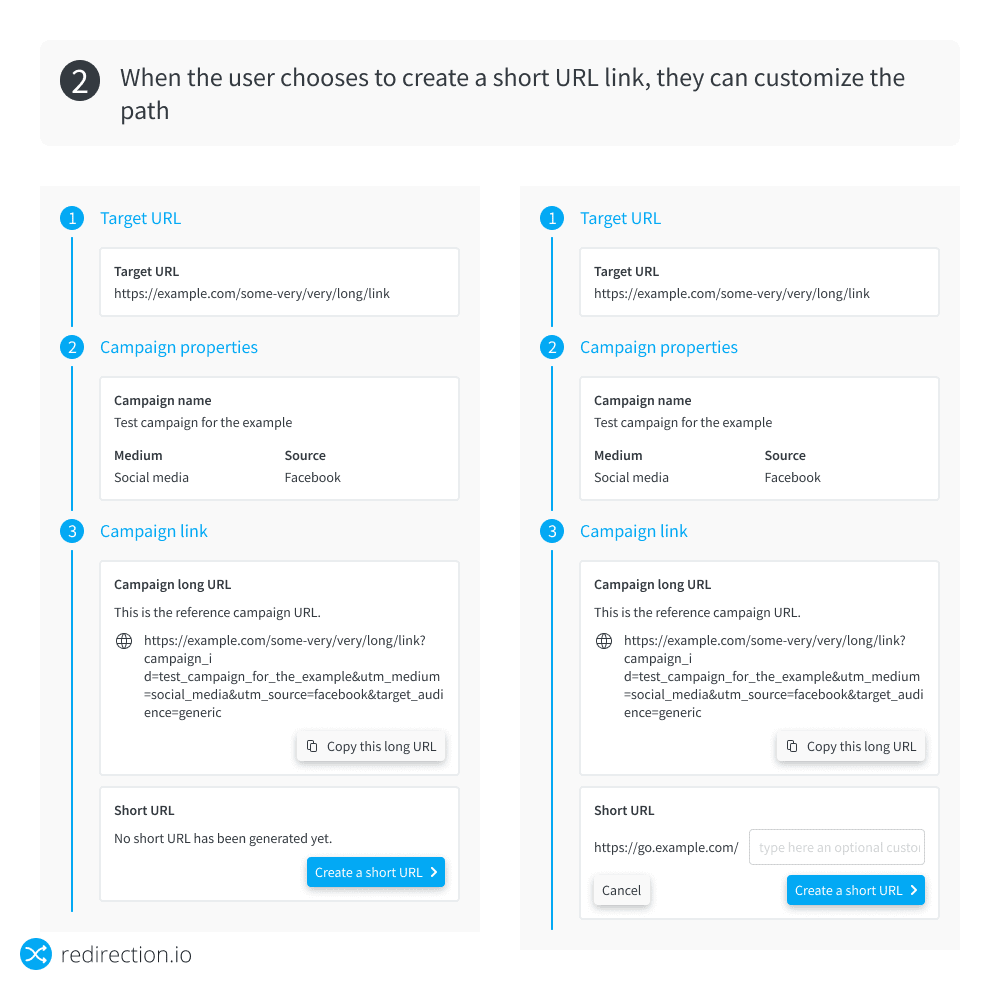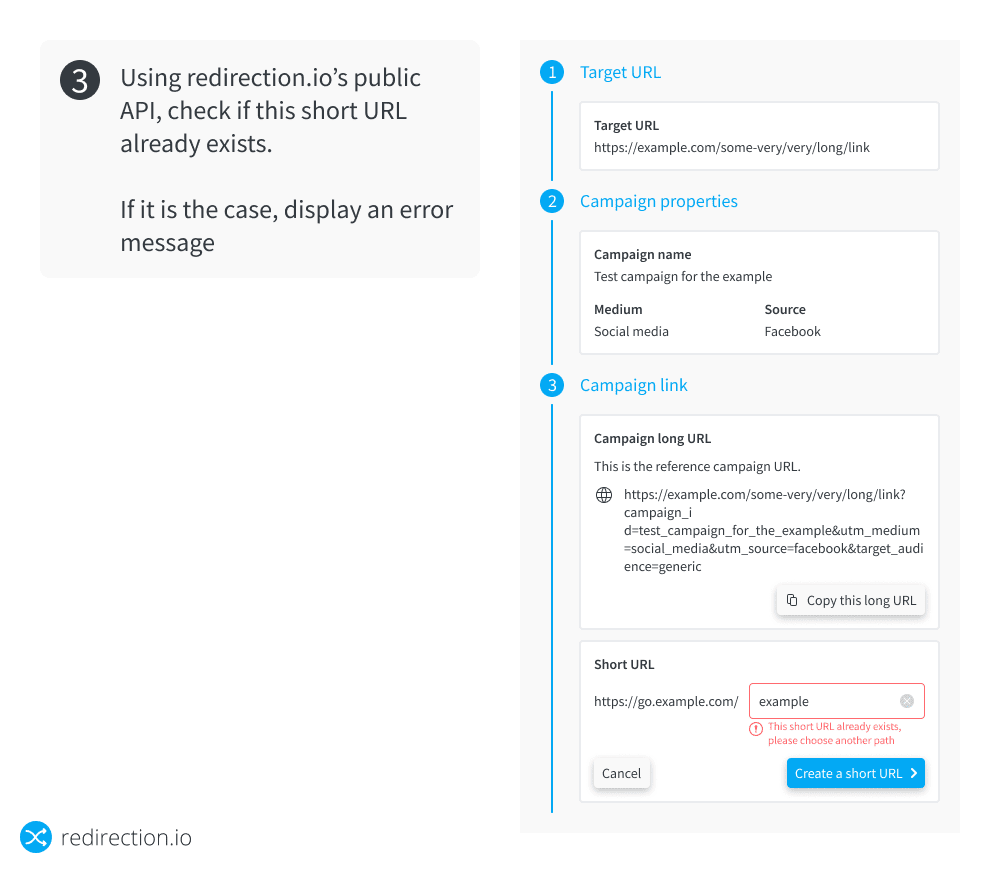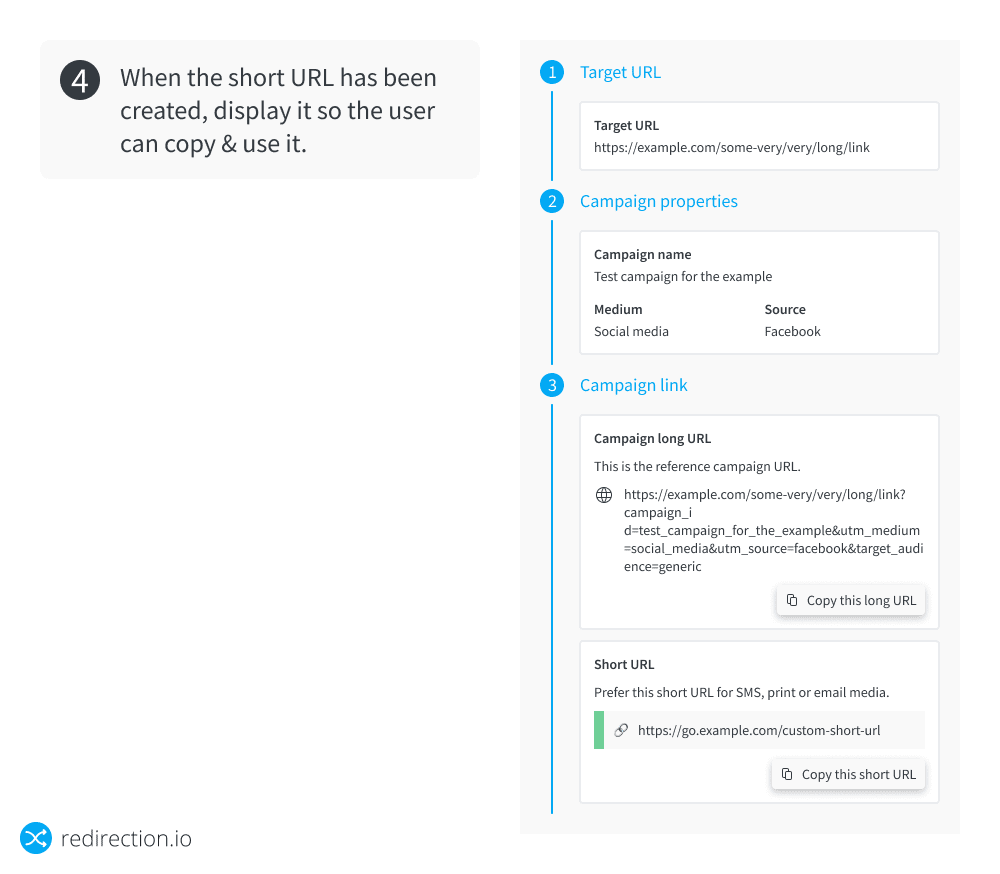Build your own branded URL shortener with redirection.io
In their communication activities — be it in marketing, public relations, or internal communications — companies often need to share web links. For practical and aesthetic reasons, these links are often shortened into "short links" or "short URLs".
In some cases, technical reasons even necessitate the use of short links. For example, when the original URL's character count is too high due to numerous tracking parameters (UTM, etc.), and the distribution channel has a strict character limit (SMS, Twitter, etc.).
Using a professional short link platform ensures control over assets and the long-term durability of your short URLs.
Many public URL shortening services exist, such as Bitly, TinyURL, Rebrandly, and more. However, for reasons of security, confidentiality, and brand control, companies often prefer to use their own domain to host their URL shortening service.
This also helps avoid the limitations and policies of public services and ensures that links will remain active for as long as needed. From the strict perspective of digital asset management, this is a significant advantage. Additionally, depending on your industry, you may not have a choice due to legal or compliance requirements.
redirection.io as the solution of choice for businesses
redirection.io is a leading solution for redirection management. In reality, redirection.io does much more than that: real-time traffic log monitoring, 404 error detection, anomaly alerts, marketing campaign management, and more. redirection.io is a SaaS solution, but it can also be self-hosted in your infrastructure if needed. It's designed to be used by marketing teams, not just technical teams, which makes it accessible to a wide range of users within a company.
A professional and robust solution, designed for businesses, that allows them to communicate using their own domain name, ensuring brand reassurance.
One use case that isn't immediately obvious is using redirection.io as a URL shortening engine. redirection.io provides a very comprehensive public API that allows you to manage redirection rules, and therefore, can serve as the technical foundation for developing a custom URL shortening service to meet your company's specific needs.
Imagine your company uses the domain name example.com for its external communications. You want to set up a URL shortening service accessible on a subdomain, for example, go.example.com, for brand reassurance. For a cautious customer — which is a good thing — receiving an institutional communication containing a link to an unknown domain can be unsettling. redirection.io provides a robust, professional, reliable, affordable, and secure solution to meet your company's needs.
An example of creating short URLs with redirection.io
For example, imagine your company develops an internal tool for managing marketing campaigns. This tool allows marketing teams to create and manage campaigns, track performance, and more. It would be very useful if this tool could automatically generate short links for each campaign. It would use your company's domain and integrate seamlessly with redirection.io to manage the redirections.
Specifically, once the campaign is created in the internal tool, a short link would be automatically generated by redirection.io, ready to be used by your teams in their marketing communications. In terms of the graphical interface, here’s what it could look like:




The good news is that setting up such a service is relatively simple, thanks to the redirection.io public API. Here are the steps to follow to integrate redirection.io into your internal marketing campaign management tool:
- Create a project on redirection.io.
- Configure the
go.example.comdomain name in redirection.io as a managed instance. Alternatively, you can also deploy this instance within your own infrastructure if you prefer to maintain full control of your data. Managed instances are simply a quicker and easier way to get started. - In your internal marketing campaign management tool, add a feature to call the redirection.io public API when a new short link needs to be created.
Your marketing campaign management tool's integration with redirection.io should:
- Generate a unique identifier for the short link (e.g.,
abc123). - Call the redirection.io API to verify that this unique identifier is not already in use. If it is, generate a new identifier and try again until a unique one is found.
- Call the redirection.io API to create a new redirection rule, so that requests to
://go.example.com/abc123are now redirected to the original long URL (for example,https://www.example.com/products/item?utm_source=newsletter&utm_medium=email&utm_campaign=spring_sale).
If you use redirection.io's managed instances, you don't have to worry about infrastructure management, software updates, security, etc. redirection.io takes care of all that for you, allowing you to focus on developing your internal tool and creating value for your business.
An example project
The redirectionio-url-shortener GitHub project is an example implementation of a URL shortening service that uses redirection.io as a backend. It's developed in PHP with the Symfony framework, but the principle can be applied with any language or framework as long as you can make HTTP calls to the redirection.io API.

Cost considerations
redirection.io's pricing model is based on the number of redirection rules you can create. The solution is designed to scale up to several million redirection rules. Depending on how you use a URL shortening service built with redirection.io, the number of rules needed can vary significantly.
For example, if each link created for a marketing campaign requires a distinct redirection rule, the total number of rules can quickly increase based on the number of campaigns, the size of your sales team, and so on.
If, however, you want to integrate the URL shortener into an internal tool used by a single team, the number of rules needed will likely be much lower. You can contact the redirection.io sales team, who can help you estimate the cost based on your intended usage.
Feel free to contact the redirection.io team to evaluate your needs.
In summary, why choose an enterprise solution?
The choice of a professional URL shortener is not just about convenience. It's a strategic choice that impacts your brand's performance, security, and reputation.
While public services can be useful for one-off uses, a solution like the one offered by redirection.io provides total control, enhanced security, and valuable analytical data. It guarantees the durability of your links and builds user trust in your brand. The following table summarizes the advantages and disadvantages of each approach:
| No short link for marketing | Public "short links" | Short links with redirection.io | |
|---|---|---|---|
| Customization | No customization | Generic domain | 100% customizable domain and URL path, which strengthens the brand. |
| Cost | No cost | Generally free with strict limitations; advanced features are paid. | Monthly or annual subscription, but control and ownership of data are guaranteed. |
| Easy Sharing | Long and complex links, difficult to remember or share. | Short and convenient links, but not aligned with your brand. | Short, relevant, and memorable links. Easy to share, even verbally. |
| Click Tracking | No tracking possible | Basic tracking in free versions, with limitations on data history. | Detailed and real-time statistics (clicks, source, device, etc.) with a complete history of data. |
| Link Durability | Depends on the original URL. | Depends on the longevity of the third-party service: if the service stops or chooses to, your links will no longer work. | Total control over the link's lifespan; no dependency on a third-party service's longevity. |
| Privacy Protection | No data collection by a third party related to shortening. | Your user data (and yours) is collected, stored, and used by a third party. | You own all the data and can export it if needed. No third-party processing of your data. |
| Technological Sovereignty | This issue does not apply to short link creation. | Data is managed by a third party, often non-European, with compliance risks (e.g., GDPR). | Data remains under your control: either self-hosted or via our secure CDN. |
| Security and Trust | The length can make the link difficult to verify. | The generic domain name can inspire distrust and be perceived as spam. | The company's domain name builds user trust. |
| Integration | No integration possible. | APIs are often limited or non-existent in free versions. | A solution designed to integrate with your software ecosystem via dedicated APIs. |
| Scalability | N/A | Low scalability; upgrading to a paid version is necessary for intensive use. | A solution designed for development and scaling, capable of managing millions of redirections. |



